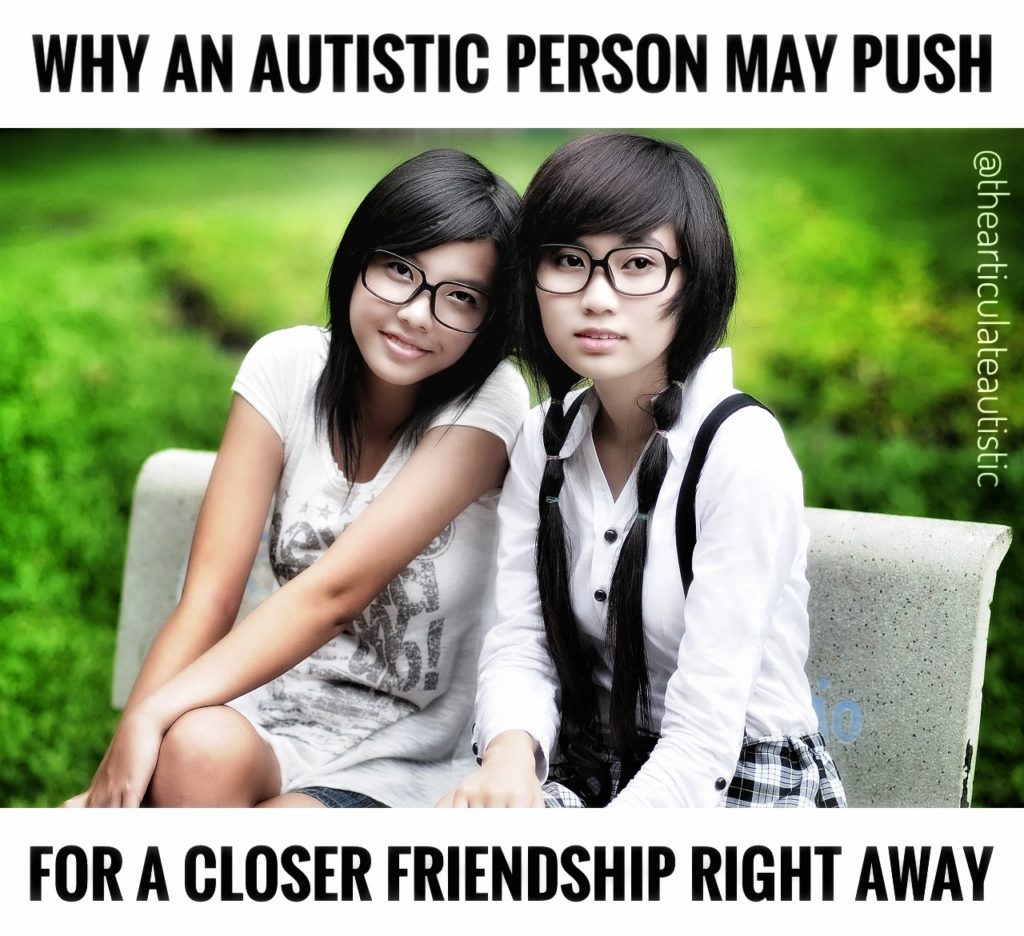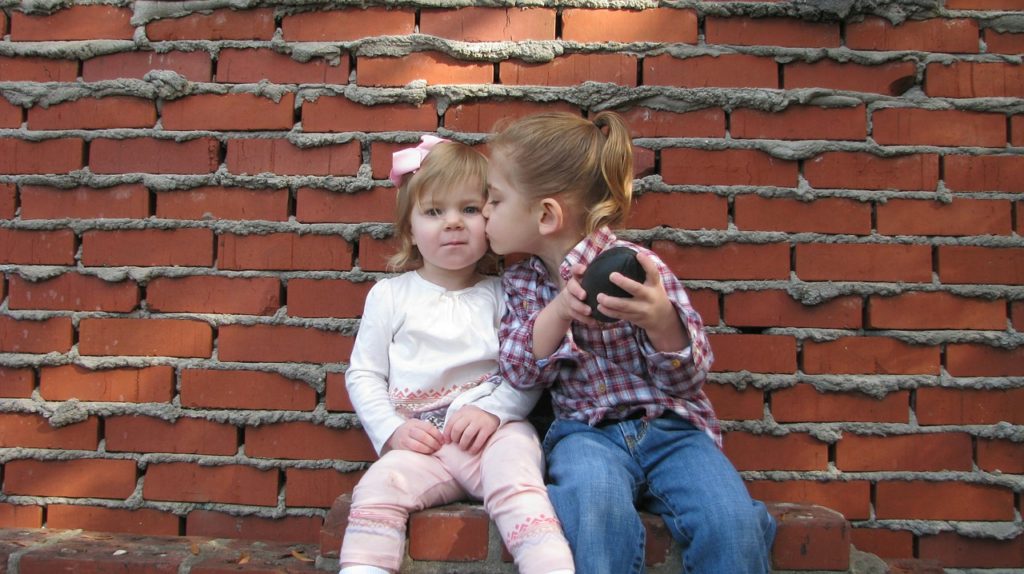Why an Autistic Person May Push for a Closer Friendship Right Away

“You have serious boundary issues.”
I’ve been told this throughout my life, and I guess, according to the neurotypical social paradigm, it’s true.
If you have a loved one on the spectrum, you may have noticed that they are often ghosted (a person who once spoke to them regularly has ceased all contact suddenly and with no explanation), rejected, and angrily told to “go away” more than a few times.
The idea that autistic people don’t want friendships is as untrue a stereotype as the idea that autistic people don’t have empathy. We do, we just experience and show it in a different way.
When it comes to making and keeping friends, we approach it according to our neurology and what comes naturally to us. Unfortunately, our authentic approach is often off-putting for neurotypical people.
The Neurotypical Approach to Friendship
I think that neurotypical people approach friendships slowly and based on common interests, shared beliefs, and social status. They start with small talk, reading each other’s body language and facial expressions along the way, enjoying the social connection itself rather than concerning themselves with the minute details of the topic itself. Like peeling back an onion layer by layer, they slowly work their way from small talk to spending time together to sharing experiences to sharing personal details to becoming close friends.
The Autistic Approach to Friendship
Autistic people, by and large, approach friendships based on gut instinct and the energy or “vibe” another person gives off. Like neurotypical people with facial expressions and body language, the autistic person reads these energetic cues to determine if the person we are interacting with would be a good “fit” for us or not.

I also believe we have more of a tendency to approach friendships based on shared experiences even if they are negative ones. I know I’ve been told I have “boundary issues” when I’ve almost immediately shared stories of bullying or abuse with someone I didn’t know well (even if the other person is the one who brought up the topic first).
The Disconnect Between How Both Neurotypes Approach Friendship
I think one of the primary disconnects between how neurodivergent people and neurotypical people approach friendship is pacing. Many autistic people, when we sense a kindred spirit, may overshare and infodump because we are so excited and happy to meet someone we can relate to and who can relate to us. We just sort of run in headlong not even noticing the neurotypical social rules we’re breaking (because we don’t know what they are).
Here’s another factor that can cause a disconnect in the way the two neurotypes approach friendships: We’re not much for maintenance. We may overwhelm you at first with our enthusiasm and desire for rapid-fire information exchange, but, as time goes on, we may disappear on you, too.
Usually, when a neurotypical person “ghosts”, they are uncomfortable and/or no longer interested in a friendship. When a neurodivergent person “ghosts”, it’s usually because the siren song of our routine and passionate interests have once again called us home. Nothing has necessarily changed in the way we feel about you as a person, but once we have you as a friend, the energetic connection remains for us, and the passing of time without contact does not diminish our regard for or connection to you.
From what I understand of neurotypical friendships, maintenance is important. Regular texts, phone calls, and visits are expected, and if they drop off, the neurotypical person believes they have done something wrong or the person is selfish and doesn’t care about them.
This is not true for most neurodivergent people. We just approach friendship and connection in a different way.

Why We Want to Get to the “Real” Part of a Friendship Quickly
Now that you know a little bit more about how your neurodivergent loved one may approach friendships, here are the reasons why we may appear to “skip over” a bunch of steps in the friend-making process:
- Small talk
While I now understand the purpose of small talk for neurotypical people, I didn’t when I was younger, and I truly hated it. I didn’t hate it because I didn’t like the person, I just legitimately did not get the point. Why was talking about the weather, what was for dinner, or reality shows so important?
(I didn’t realize that the socialization itself was the goal, not the topic.)
Small talk often confuses and frustrates autistic people, so when you’ve gone from a casual acquaintance to a close friend, we know we won’t have to do that anymore. The anxiety, the confusion, the uncertainty about how to respond, the not knowing when it’s time to end the conversation–all of that goes away, and it’s a tremendous relief!
- Misunderstandings
This is probably the single biggest reason I overshare and infodump when I meet someone I’d like to be friends with: I cannot stand misunderstandings. I hate them with a passion, and they happen all the time. Unless I have my pretending-to-be-neurotypical mask superglued to my face, so to speak, there will be misunderstandings.
While I may speak neurotypical, autistic is my first language, and it always will be.
My logic in oversharing is that if you understand my quirks, my intentions, and my motivations, you’ll be less likely to be hurt, offended, or confused by something I’ve said or done and our interactions will run much more smoothly.
Sadly, this often does not work in the case of my neurotypical counterparts because not only does oversharing come across (mistakenly) as desperation, but apparently neurotypical people can still be hurt and offended by something I’ve done or said even if they know full well that I had no intention of doing so (and am fully innocent of even the knowledge of having made any social mistake).
Again, my logic is sound to me, but it often doesn’t translate across neurotypes. If you know an autistic person who tends to overshare and overexplain, this may be what they are trying to do: Avoid those dreaded misunderstandings at all costs.
- Heartbreak
Us autistic people have a tough enough time making and keeping friends due to our very different approaches to it. Because of this, we may think we’ve made a close friend in a matter of days or weeks only for the person to cease all contact with us either after telling us off for something we didn’t even realize we’d done, or just disappearing altogether without a word.
It’s heartbreaking and baffling for an autistic person to suddenly lose a friendship this way. We don’t know what we did wrong, and any attempts to ask for clarification are usually met with derision, not explanation, because for neurotypical people, asking clarifying questions can come across as offensive, further damaging the relationship, not repairing it.
The Takeaway
Autistic people approach friendships differently than neurotypical people. Because of this, the way an autistic person might show interest in others is the way a neurotypical person might show disinterest, so it can be very confusing on both sides.
If you have an autistic loved one, please keep this article in mind when interacting with them. Also, send this to your autistic loved one (or read it to them) and ask them if this is what they experience when trying to make friends.
I think the best thing we can do is come up with compromises on both sides. Nobody should have to change who they are, but understanding can go a LONG way in preserving relationships whose only real challenge is the disconnect between different neurological languages.



This.
Quick note. Having the book adverts in the middle of the post like this is enough for me to forget what I have just read while I scroll.
Thank you, Nat!
Same here. The text was fantastic, spot on. But the long ad break kind of made me lose track. Please move the bookads to *after* the article. I’d like to share this and have them read the last part as well.
Will do. 🙂
I like to see articles like this. I do not think most NTs have developed the awareness that their perspective of “normal” is just THEIR perspective. Its not their fault, even ND people have at some time in their life assumed what we call normal is shared by everyone else too. But we have had to step outside of our “normal bubble” because we are often called out for not conforming to the NT normal. So we learn to see both perspectives. This article gives both perspectives so it is a win-win for whoever reads it!
Thank you so much!
This article made me cry. It explains so much about me. I am thinking about sending it to others, but of course, I am quite shy. Thank you.
Thank you so much for sharing your thoughts, Jason. I hope you felt comfortable enough to post it on your social media and/or share it with your friends, and I hope you have good friends who truly understand you.
Hello, Jaime,
This is truly a wonderful article.
I’ve come accross this one a long time ago, and today I re-read it again when I was searching for topics about friendship & autism.
I wonder if it’s alright that I try to translate this article into my native language and share with other autistic people here who might relate to this?
I will of course link it back to this original article on your site and will credit your name.
Thank you for writing this article, and thank you in advance if this request is accepted.
Sincerely,
Miya
Yes, you can! Thank you so much for asking. 🙂
I can recognize a lot of the traits and situations described in the article thanks to a growing and rather important friendship with someone who had both autism and ADHD. Unfortunately, I am very confused as to how things are supposed to continue once the autistic person is comfortable and no longer bothers with “maintenance”, i.e., does not actually participate in an active relationship. You say that that the regard for and connection to someone remains, but if it’s passive, what is the NT friend supposed to do once they’ve reached this point and are left alone?
This article may help to read as a follow-up: https://www.thearticulateautistic.com/when-a-cactus-meets-a-rose-why-autistic-neurotypical-friendships-often-fail-and-how-to-prevent-it/